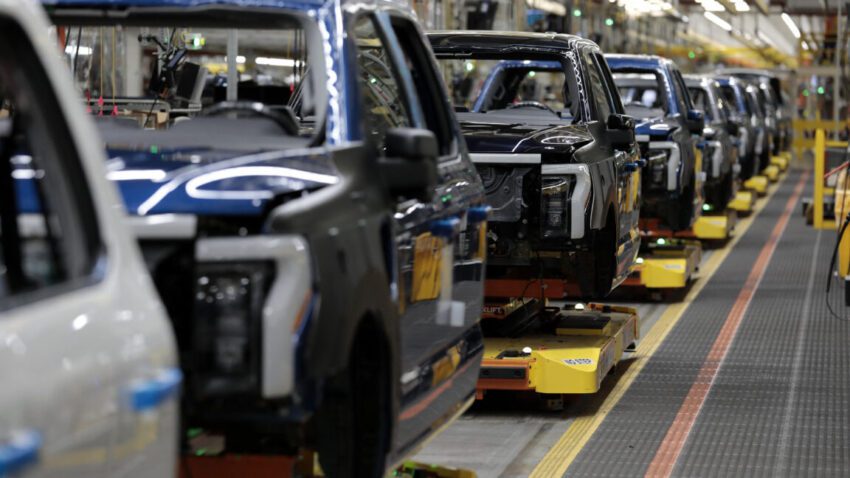
ford says no exact date to restart Ford has announced that there is “no exact date” for the resumption of production of its F-150 Lightning electric pickup truck, raising concerns about the future of one of the country’s most popular electric vehicles.
ford says no exact date to restart
Overview of the F-150 Lightning
The Ford F-150 Lightning represents a significant milestone in the automotive industry, particularly in the electric vehicle (EV) segment. Launched as an electrified version of the best-selling F-150 pickup truck, the Lightning has garnered attention for its impressive performance and efficiency. While its exterior design closely resembles that of traditional F-150 models, the Lightning features advanced electric powertrains that deliver a smoother and faster driving experience. This vehicle is not only a testament to Ford’s commitment to electrification but also a response to the growing demand for sustainable transportation options.
Performance and Features
The F-150 Lightning is equipped with dual electric motors that provide all-wheel drive and impressive torque, enabling rapid acceleration and enhanced towing capabilities. The truck can achieve 0 to 60 mph in just over four seconds, a remarkable feat for a vehicle of its size. Additionally, the Lightning boasts a range of up to 300 miles on a single charge, making it a practical choice for both urban and rural drivers.
Moreover, the Lightning is packed with innovative technology, including Ford’s SYNC 4A infotainment system, which features a large touchscreen interface and advanced connectivity options. The vehicle also supports over-the-air software updates, ensuring that owners can benefit from the latest features and improvements without needing to visit a dealership.
Production Challenges
Despite its initial success, the production of the F-150 Lightning has faced significant hurdles. Recently, Ford suspended production due to an aluminum shortage caused by a fire at a supplier’s factory in New York. This incident has had a cascading effect on the supply chain, impacting not only Ford but also other manufacturers reliant on aluminum for their vehicles.
Financial Implications
The financial ramifications of this production halt are substantial. Ford has estimated that the aluminum shortage could result in losses of up to $2 billion. This figure underscores the vulnerabilities that automakers face in today’s complex supply chains, where disruptions can lead to significant financial setbacks. The company is currently navigating these challenges while trying to maintain its competitive edge in the rapidly evolving EV market.
Management Discussions
According to a report from The Wall Street Journal, Ford’s management is reportedly in “active discussions about scrapping” the F-150 Lightning. This revelation has sent shockwaves through the automotive community, raising questions about the future of the electric pickup segment and Ford’s commitment to its electrification strategy. While Ford has refrained from commenting on speculation regarding its future product plans, the uncertainty surrounding the Lightning’s production timeline has left many stakeholders concerned.
Market Position and Competition
Despite the challenges, the F-150 Lightning has maintained its status as the best-selling electric pickup truck in the United States. In the third quarter of this year, the Lightning achieved record sales, demonstrating strong consumer interest and demand. However, the competitive landscape is rapidly changing, with new entrants such as Tesla’s CyberTruck, Chevrolet’s electric Silverado, GMC’s Hummer EV, and Rivian’s R1T vying for market share.
Consumer Reception
The consumer reception of the F-150 Lightning has been largely positive, with many praising its performance, technology, and overall value proposition. Customers have highlighted the truck’s ability to combine the ruggedness expected from a pickup with the benefits of electric power. This blend of features has resonated with both traditional truck buyers and environmentally conscious consumers looking for sustainable alternatives.
Challenges from New Competitors
As competition intensifies, Ford faces the challenge of differentiating the Lightning from its rivals. The Tesla CyberTruck, for instance, has generated significant buzz with its unique design and advanced technology features. Meanwhile, Rivian has positioned itself as a premium electric truck manufacturer, appealing to a niche market of adventure-seeking consumers. Ford’s ability to respond to these competitive pressures will be crucial in determining the future success of the F-150 Lightning.
Stakeholder Reactions
The uncertainty surrounding the F-150 Lightning’s production has elicited a range of reactions from stakeholders, including investors, consumers, and industry analysts. Investors are particularly concerned about the potential financial impact of the production halt and the discussions regarding the future of the Lightning. Stock prices for Ford have experienced volatility as a result of these developments, reflecting investor apprehension about the company’s ability to navigate the challenges ahead.
Consumer Concerns
Consumers who have already placed orders for the F-150 Lightning are understandably anxious about the production delays. Many have been eagerly awaiting their vehicles, and the lack of clarity regarding the timeline for resumption of production has left them in a state of uncertainty. Ford’s communication strategy will be critical in managing customer expectations and maintaining trust among its consumer base.
Industry Analysts’ Perspectives
Industry analysts have weighed in on the situation, emphasizing the importance of Ford’s response to the current challenges. Some experts argue that the company must prioritize transparency and communication with stakeholders to mitigate concerns and maintain confidence in its electrification strategy. Others suggest that Ford may need to reassess its supply chain management practices to better withstand future disruptions.
Future Outlook
The future of the F-150 Lightning remains uncertain, but several factors will play a crucial role in determining its trajectory. Ford’s ability to resolve the aluminum supply chain issues and resume production will be paramount. Additionally, the company must navigate the competitive landscape effectively, ensuring that the Lightning remains an attractive option for consumers in a crowded market.
Potential Strategic Moves
To bolster its position, Ford may consider several strategic moves. These could include investing in alternative materials to reduce reliance on aluminum, enhancing its production capabilities, and expanding its marketing efforts to highlight the unique features of the F-150 Lightning. Collaborations with suppliers to secure a more stable supply chain could also be beneficial in mitigating future risks.
Long-Term Implications for Ford
The challenges faced by the F-150 Lightning could have broader implications for Ford’s overall electrification strategy. As the automotive industry shifts toward electric vehicles, the success or failure of the Lightning may influence the company’s future investments in EV technology and product development. A strong performance from the Lightning could bolster Ford’s reputation as a leader in the electric pickup segment, while setbacks could hinder its efforts to compete effectively in the evolving market.
Conclusion
As Ford navigates the complexities surrounding the F-150 Lightning, the automotive community will be closely watching for updates on production timelines and strategic decisions. The Lightning’s status as the best-selling electric pickup truck in the U.S. underscores its importance to Ford’s electrification efforts, but the challenges it faces cannot be overlooked. The coming months will be critical in determining the future of this innovative vehicle and Ford’s position in the rapidly changing automotive landscape.
Source: Original report
Was this helpful?
Last Modified: November 7, 2025 at 9:37 pm
1 views















